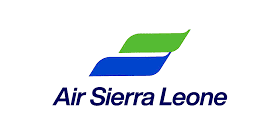 Air Sierra Leone Positions Lagos as Key Gateway Linking West Africa and Europe
Air Sierra Leone Positions Lagos as Key Gateway Linking West Africa and Europe
With a distinct vision to deepen regional ties and deliver a unique travel experience, Air Sierra Leone is charting an ambitious course across West Africa, placing Nigeria at the heart of its growth strategy. Since its entry into the Nigerian market on January 22, the airline has set out to offer far more than just flights—it aims to become a cultural bridge between Sierra Leone and its largest neighbor, while opening new avenues for seamless connections to Europe.
In a recent engagement in Lagos, Mrs. Genevieve Fiewor, Country Manager for Air Sierra Leone, underscored the airline’s mission as more than transportation. “We are striving to be the airline of choice, representing Sierra Leone while offering travelers the opportunity to explore new horizons with us,” she shared, highlighting the carrier’s dual role as aviation provider and cultural ambassador. This approach is resonating with a growing subset of Nigerian travelers seeking not only convenience and affordability but also a sense of belonging and shared African identity when they fly.
Air Sierra Leone’s presence in Nigeria is embodied by its direct service between Lagos and Freetown, operated with a comfortable Embraer 145 aircraft. This twice-weekly route—departing Lagos at 6 a.m. every Tuesday and Saturday—connects passengers to London Gatwick via Freetown, utilizing the modern Boeing 737 MAX 8 for the onward journey. The carefully coordinated schedule ensures that travelers can leave Lagos in the morning and arrive in London by the evening, providing a level of efficiency and convenience that meets the needs of both leisure and business travelers across the region.
One of the carrier’s standout offerings is its three-piece baggage allowance on the London route, a benefit described as “unbeatable” by Mrs. Fiewor given its competitive \$950 ticket price. Fares for the Lagos–Freetown sector are equally attractive, ranging from \$500 to \$550—pricing that the airline believes will attract a broader segment of Nigerian passengers and drive up traffic as awareness builds.
Air Sierra Leone sees its Lagos operations not just as a commercial venture but as a strategic step in fostering greater regional integration. For many Nigerians, the connection is deeper than travel; Sierra Leone is visa-free for Nigerians, and cultural similarities—down to greetings that echo familiar Yoruba expressions—make visitors feel instantly at home. “It’s not a foreign land—it’s Africa welcoming Africa,” Mrs. Fiewor remarked, emphasizing the warmth and hospitality awaiting Nigerian travelers in Freetown.
Despite the positive outlook, the airline acknowledges the initial challenges that come with consolidating its position in a competitive market. Mrs. Fiewor pointed to the ongoing renovations at Lagos airports, which have temporarily reduced available parking and posed operational hurdles. However, she praised the Federal Airports Authority of Nigeria (FAAN) for fostering a collaborative environment, saying, “They are friendly, we are friendly, and when two friendly partners work together, the sparks are joyful.” Such mutual support is vital as the region’s aviation landscape continues to evolve.
Air Sierra Leone’s strategy goes beyond basic air connectivity. The airline is actively gearing up for the upcoming holiday season, expecting to see a spike in leisure travel as Nigerians plan family visits, holidays, and business trips. “Our fares are out, our operations are set, and we are ready to welcome more Nigerians onboard,” Mrs. Fiewor announced, signaling the carrier’s readiness to serve the seasonal surge in demand.
For the African travel trade, Air Sierra Leone’s approach offers important lessons on leveraging cultural affinity to boost business. By positioning itself as a carrier that understands and celebrates shared heritage, the airline is appealing to a sense of unity and belonging that can be a powerful differentiator in a crowded market. Its affordable fares, generous baggage policies, and streamlined connections further underscore a commitment to making regional and international travel accessible to a wider audience.
The airline’s pathway to London through Freetown also opens up new opportunities for cross-continental trade, tourism, and diaspora engagement. As West African economies continue to grow and the demand for international travel rises, seamless connections such as those offered by Air Sierra Leone will become increasingly crucial. The carrier’s investment in modern aircraft and customer-oriented service positions it well to capture a growing share of this market.
Looking ahead, Air Sierra Leone’s expansion in Nigeria is poised to influence regional aviation trends in several ways. Firstly, its focus on cultural connection and customer experience sets a benchmark for other operators seeking to build loyalty among West African travelers. Secondly, the airline’s partnership with local authorities and adaptive response to operational challenges demonstrate the importance of flexibility and collaboration in the sector.
As the airline builds its reputation and passenger base, it is clear that Air Sierra Leone is not content to be just another entrant in the market. Instead, it is working to become a vital connector—linking West Africa to Europe and, in the process, carrying the vibrant spirit of Sierra Leone to new destinations. For Nigeria’s travel professionals, this development signals both new partnership possibilities and an evolving competitive landscape where cultural resonance, service quality, and strategic connectivity will define future success.
In an industry where travelers are increasingly seeking authenticity, comfort, and value, Air Sierra Leone’s story is a reminder of the potential for African carriers to shape the continent’s aviation narrative. As the airline continues to grow, stakeholders across the region will be watching closely—not only to see how it expands its footprint, but also how it helps redefine what it means to connect Africa with the world.
